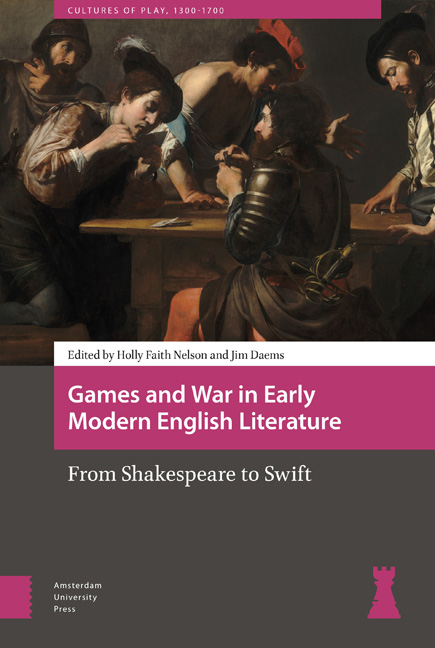Book contents
- Frontmatter
- Dedication
- Contents
- Acknowledgements
- The Interplay of Games and War in Early Modern English Literature: An Introduction
- 1 ‘Can this cock-pit hold the vasty fields of France?’ Cock-Fighting and the Representation of War in Shakespeare’s Henry V
- 2 Game Over: Play and War in Shakespeare’s Troilus and Cressida
- 3 Thomas Morton’s Maypole: Revels, War Games, and Transatlantic Conflict
- 4 Milton’s Epic Games: War and Recreation in Paradise Lost
- 5 Ciphers and Gaming for Pleasure and War
- 6 Virtual Reality, Role Play, and World-Building in Margaret Cavendish’s Literary War Games
- 7 Dice, Jesting, and the ‘Pleasing Delusion’ of Warlike Love in Aphra Behn’s The Luckey Chance
- 8 War and Games in Swift’s Battle of the Books and Gulliver’s Travels
- 9 Time-Servers, Turncoats, and the Hostile Reprint: Considering the Conflict of a Paper War
- Index
3 - Thomas Morton’s Maypole: Revels, War Games, and Transatlantic Conflict
Published online by Cambridge University Press: 21 November 2020
- Frontmatter
- Dedication
- Contents
- Acknowledgements
- The Interplay of Games and War in Early Modern English Literature: An Introduction
- 1 ‘Can this cock-pit hold the vasty fields of France?’ Cock-Fighting and the Representation of War in Shakespeare’s Henry V
- 2 Game Over: Play and War in Shakespeare’s Troilus and Cressida
- 3 Thomas Morton’s Maypole: Revels, War Games, and Transatlantic Conflict
- 4 Milton’s Epic Games: War and Recreation in Paradise Lost
- 5 Ciphers and Gaming for Pleasure and War
- 6 Virtual Reality, Role Play, and World-Building in Margaret Cavendish’s Literary War Games
- 7 Dice, Jesting, and the ‘Pleasing Delusion’ of Warlike Love in Aphra Behn’s The Luckey Chance
- 8 War and Games in Swift’s Battle of the Books and Gulliver’s Travels
- 9 Time-Servers, Turncoats, and the Hostile Reprint: Considering the Conflict of a Paper War
- Index
Summary
Abstract
One of the stated purposes of James I's 1618 Declaration and Charles I's Book of Sports was to prepare subjects for war through the physical exercise provided by ‘lawfull’ sports and recreations. These activities were also conceived as a form of spiritual warfare, initially against Catholicism and increasingly against Puritan opposition. This chapter argues that these purposes are evident in Thomas Morton's account of the Ma-re Mount Maypole in New English Canaan. By reading the Maypole as the central symbol of the tract, Daems demonstrates that the relationship between sports and war played a significant role in transatlantic conflict between Puritans and Royalists.
Keywords: William Bradford and the Plymouth Plantation; Indigenous peoples in early modern literature; North America in early modern literature; fur trade in early modern literature
Although Puritan opposition to popular and Church of England festivities developed during the reign of Elizabeth I, James I's The Kings Maiesties Declaration to His Subiects, concerning Lawfull Sports to be used (1618), which expanded his 1617 Lancashire declaration throughout the realm, polarized the debate. Charles I's reissue of his father's declaration in 1633, commonly referred to as The Book of Sports, significantly exacerbated the opposition. James I's Declaration legitimized a number of popular festivities, Holy Day festivities, and sports that had been hindered by ‘Puritanes & precise people’. These activities included dancing, archery, ‘May-Games, Whitson Ales, and Morris-dances, and the setting vp of May-poles and other sports therewith vsed, so as the same be had in due and conuenient time, without impediment or neglect of diuine Seruice’. Although initially intended to further the conversion of ‘Popish Recusants’ to the Church of England, the Declaration notes that the realm ‘is much infested’ with ‘Papists and Puritanes’, a coupling which, in itself, must have angered Puritans. However, as Gregory M. Colón Semenza has argued, James I's declaration was essentially conservative in nature, and its distinctions between ‘lawful’ and ‘unlawful’ sports were reassertions of the Church's position. When reissued, The Book of Sports furthered the ideological aims of Charles I and Archbishop William Laud to strengthen allegiance to the monarch and the Church of England by regulating popular festivities. This, as Leah Marcus argues, ‘sacramentalized’ ‘lawful’ sports: ‘The old pastimes were a way of taking the Church out into the world and molding the countryside into an image of ecclesiastical order; they become an extension of sacred space.’
- Type
- Chapter
- Information
- Games and War in Early Modern English LiteratureFrom Shakespeare to Swift, pp. 55 - 72Publisher: Amsterdam University PressPrint publication year: 2019

